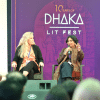Media, critical of govt, under severe pressure
Bangladesh has been taken to task by Amnesty International for becoming increasingly dangerous for those speaking their minds.
“Bangladesh became increasingly dangerous for those speaking their own minds, with a pattern of repression of freedom of expression that included the killing of several secularist bloggers and publishers,” said Amnesty's latest global report.
The country's independent media outlets critical of the authorities came under severe pressure and freedom of expression was restricted, it added.
The London-based human rights watchdog on Tuesday published the 2015-2016 annual report on human rights situation in 160 countries and territories during 2015.
According to the report, the government in October last year warned business enterprises that they would be penalised if they advertised in Prothom Alo and The Daily Star, two leading newspapers known for their critical stance.
A parliamentary standing committee in November recommended that the anti-corruption NGO Transparency International should be deregistered in Bangladesh for criticising parliament, said Amnesty.
The rights watchdog said the authorities blocked social media messaging and other communications applications that month, in what constituted restrictions on freedom of expression.
The report said bloggers expressing secular views were attacked, reportedly by Islamist groups. At least nine secularist bloggers and publishers were attacked, five of whom died from their injuries.
“Government authorities, including the prime minister, accused the bloggers and publishers of offending religious feelings in their writings.”
Amnesty pointed out violation of human rights through enforced disappearances, torture and other ill-treatment and violence against women.
Mentioning that over 40 people were subjected to enforced disappearance, the report said plainclothes members of security forces arrested dozens of people and later denied knowledge of their whereabouts.
Citing a survey of human rights organisation Ain o Salish Kendra, Amnesty put the number of incidents of enforced disappearance at 43, including two women, between January and September.
Of the 43, six were later found dead, four released after abduction, and five found in police custody. The fate and whereabouts of the 28 others was unknown.
Trials continued against three Rapid Action Battalion officials charged with abduction and killing of seven people in April 2014, said the report adding, “No members of security forces or officials implicated in other cases of enforced disappearance were brought to justice.”
Amnesty found there had been widespread torture and other ill-treatment in police custody in Bangladesh and said the torture complaints were rarely investigated.
The report stated the issue of the murders of foreign nationals and the anti-government movement by the BNP that saw many buses and other vehicles attacked with petrol bombs.
“Dozens of passengers were killed and scores more injured. No one directly involved in the attacks was brought to justice,” it said.
The rights watchdog voiced concern over violence against women and girls as the organisation, citing Bangladesh National Women Lawyers Association, said over 240 complaints of rape were reported in the media between January and May.
“Human rights groups said while reported incidents of rape had risen in recent years, the conviction rate was extremely low, mainly due to the lack of timely and effective investigations.”
Mentioning the gruesome killing of Samiul Islam Rajon of Sylhet, the report said at least 198 people were sentenced to death, including six for killing Rajon.
Amnesty, like in its previous reports, criticised the proceedings of International Crimes Tribunal saying the proceedings were marked with severe irregularities and violations of the right to a fair trial.

 For all latest news, follow The Daily Star's Google News channel.
For all latest news, follow The Daily Star's Google News channel. 








Comments